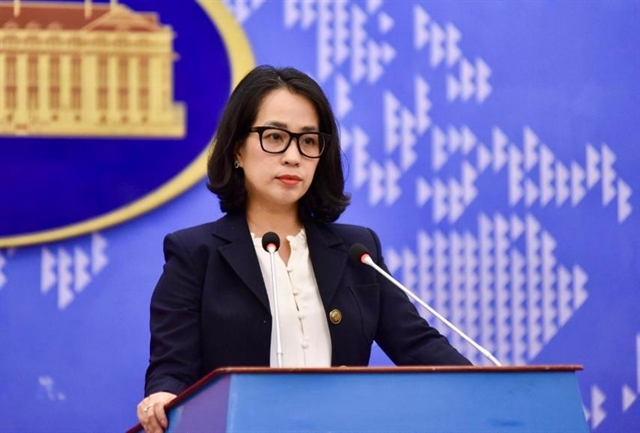 Politics & Law
Politics & Law


|
| Professor Carl Thayer from the New South Wales University at an interview with Vietnam News Agency reporters. VNA/VNS Photo Nguyễn Minh |
HÀ NỘI — The breakthroughs and achievements Việt Nam has obtained after 35 years of Đổi mới (Renewal) and five years of implementing the 12th National Party Congress’s Resolution haven't only brought the country rapid development but have also significantly contributed to enhancing the reputation and role of Việt Nam in the international arena, according to experts.
Việt Nam's achievements under the leadership of the Communist Party of Việt Nam (CPV) have become more prominent and meaningful as the world is experiencing many changes, they said.
Professor Carlyle Thayer from the New South Wales University said the 13th National Congress of CPV, running from January 25 to February 1, was very important in deciding socio-economic development plans.
Professor Thayer said that last year Việt Nam succeeded in controlling the COVID-19 pandemic, giving it a solid foundation for developing a recovery plan.
Factors for the success included quick, decisive and consistent action by the Vietnamese Government to minimise the impact of the pandemic by protecting the population by closing borders, implementing quarantine measures, wearing masks and social distancing.
Providing daily transparent information on the pandemic to people, supporting the community and combating the spread of fake news were among the others. Another important factor is that Vietnamese people trust and support the Government's efforts, he said.
Lê Hồng Hiệp, a fellow with the Singapore-based ISEAS-Yusof Iskak Institute, agreed.
Last year, Việt Nam was still one of the rare bright spots of positive growth while many economies and most countries in the region had negative growth, he said.
“This achievement showed that the endurance and resilience of the Vietnamese economy have increased significantly in recent years.”
Hiệp said Việt Nam did not only take advantage of new developments in the strategic environment but turned challenges into opportunities, especially by attracting high-quality foreign investors.
According to him, Việt Nam has created the foundation to enter the "take-off" phase, aiming to become a developed economy by 2045.
Many experts expressed their belief Việt Nam could be optimistic about success because it had done very well over the past time.
However, some said the country would face a number of challenges at home and abroad.
Challenges
In the future, the country has to maintain continuous growth momentum, reforming growth model towards sustainability to tackle income inequality and the effects of an ageing population, while the quality of education and training has not kept up with development requirements, according to Hiệp.
Environmental pollution, natural disasters, and climate change might also be problems.
He said the increasingly unstable international environment with a lot of unpredictable impacts from greater competition between major countries was the biggest challenge.
As Việt Nam now has a new stature, Hiệp hoped the country would promote its position and influence in the international arena, becoming an upper-middle-income country by 2030.
Thayer said the COVID-19 would continue to have an impact on the country.
After the 13th National Congress ends, one of the priorities of the Vietnamese Government is to secure the supply of vaccines for its residents, Thayer said, adding that after that, Viêt Nam will consider opening its borders.
“The Vietnamese Government needs to come up with plans to support the recovery and growth of tens of thousands of private enterprises, and help workers get jobs again,” he said.
Prof. Dr Vladimir Nikolaevich Kolotov, Director of the Ho Chi Minh Institute under the Saint Petersburg State University, said the 13th Congress of CPV had all elements to become an important political event in Việt Nam’s history, opening a new era for the nation’s development.
In an interview with the Vietnam News Agency’s correspondent in Russia, he said preparations for the National Party Congresses had been made carefully, including the building of draft political reports.
The draft political report presented by Party General Secretary and State President Nguyễn Phú Trọng at the 13th National Party Congress comprehensively assessed the domestic and international situation, as well as set out national development plans until 2045, the Russian expert said.
According to Kolotov, Việt Nam has been undertaking a large-scale cleanup of its Party member lineup to select a "fifth generation" of competent and virtuous Party and State leaders to carry out these plans.
The expert said he was particularly interested in Việt Nam’s national development plans to 2025, 2030 and 2045, stressing the country needs to flexibly implement its foreign and domestic policies to defend its interests.
He attributed Việt Nam’s rapid socio-economic development to political stability, favourable regional integration and economic growth, noting that if Việt Nam continues this policy, it would surely continue to thrive.
Associate Professor Martin Grossheim, an expert on Asian history at Seoul National University’s College of Humanities, said the CPV had met the legitimate needs and aspirations of the people, hence the nation’s rapid and comprehensive developments in recent decades.
According to Grossheim, the CPV successfully led Vietnamese people to victory in the past struggles for national independence against the French and American troops and officially launched the renewal process at its 6th national congress in 1986.
Three decades on, Việt Nam today is totally different. The poverty rate has dropped to under 10 per cent and local living standards have improved significantly.
This means the Vietnamese Party and State have so far fulfilled part of its motto of “wealthy people; strong nation; civilised, democratic and fair society",
Grossheim lauded good outcomes of the corruption fight in Việt Nam, saying the work needs greater attention.
He noted during its renewal process, Việt Nam should focus on sustainable economic development and climate change response, particularly in the Mekong Delta region. — VNS

.jpg)


